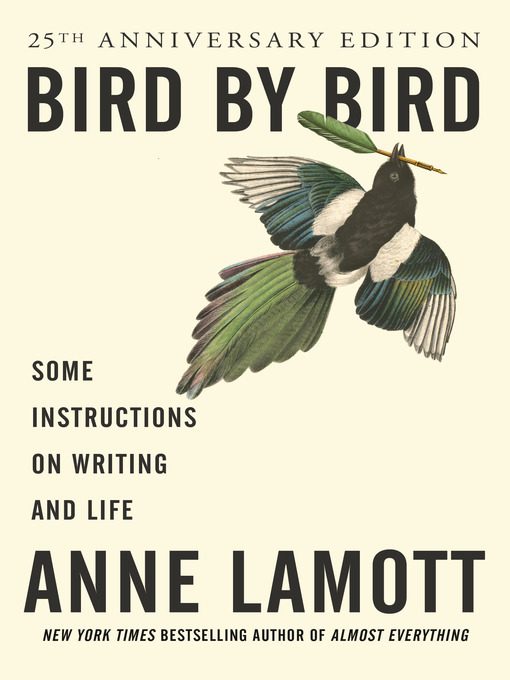Anyone who has survived childhood has enough information about life to last him the rest of his days. ~Flannery O’Connor
Print | Kindle(eBook) | Audiobook
Anne Lamott’s Bird by Bird is a very great and funny book for aspiring writers, the book contains lots of advice she normally gives her creative writing workshop participants such as Getting started as a writer, Short Assignments, Shitty First Drafts, Writing as a gift, False Starts, Perfectionism, Writers Block, publication, among other insights.
The genesis of the title, Bird by Bird, Anne Lamott writes:
“Thirty years ago my older brother, who was ten years old at the time, was trying to get a report on birds written that he’d had three months to write [It] was due the next day. We were out at our family cabin in Bolinas, and he was at the kitchen table close to tears, surrounded by binder paper and pencils and unopened books on birds, immobilized by the hugeness of the task ahead. Then my father sat down beside him, put his arm around my brother’s shoulder, and said, ‘Bird by bird, buddy. Just take it bird by bird.'”
Here are my favorite takeaways from reading Bird by Bird: Some Instructions on Writing and Life by Anne Lamott:
‘Writing a novel is like driving a car at night. You can see only as far as your headlights, but you can make the whole trip that way. ‘ You don’t have to see where you’re going, you don’t have to see your destination or everything you will pass along the way.” – E.L.Doctrow
Short Assignments
- Anne advises her student to start writing about their childhood, about a holiday, an event, this short assignment and early memories helps the writer to develop the discipline to write longer stories or novels.
- Say to yourself in the kindest possible way, Look, honey, all we’re going to do for now is to write a description of the river at sunrise, or the young child swimming in the pool at the club, or the first time the man sees the woman he will marry. That is all we are going to do for now. We are just going to take this bird by bird. But we are going to finish this one short assignment.
- Writing can be a pretty desperate endeavor, because it is about some of our deepest needs: our need to be visible, to be heard, our need to make sense of our lives, to wake up and grow and belong.
Shitty First Draft
- The first draft is the child’s draft, where you let it all pour out and then let it romp all over the place, knowing that no one is going to see it and that you can shape it later. You just let this childlike part of you channel whatever voices and visions come through and onto the page.
Almost all good writing begins with terrible first efforts. You need to start somewhere. Start by getting something— anything—down on paper.
- The first draft is the downdraft—you just get it down. The second draft is the updraft—you fix it up. You try to say what you have to say more accurately. And the third draft is the dental draft, where you check every tooth, to see if it’s loose or cramped or decayed, or even, healthy.
Perfectionism
Perfectionism is the voice of the oppressor, the enemy of the people. It will keep you cramped and insane your whole life, and it is the main obstacle between you and a shitty first draft.
- Perfectionism is based on the obsessive belief that if you run carefully enough, hitting each stepping-stone just right, you won’t have to die. The truth is that you will die anyway and that a lot of people who aren’t even looking at their feet are going to do a whole lot better than you, and have a lot more fun while they’re doing it.
- Perfectionism means that you try desperately not to leave so much mess to clean up. But clutter and mess show us that life is being lived. Clutter is wonderfully fertile ground—you can still discover new treasures under all those piles, clean things up, edit things out, fix things, get a grip. Tidiness suggests that something is as good as it’s going to get. Tidiness makes me think of held breath, of suspended animation, while writing needs to breathe and move.
Perfectionism will ruin your writing, blocking inventiveness and playfulness and life force.
Polaroids
- Writing a first draft is very much like watching a Polaroid develop. You can’t—and, in fact, you’re not supposed to— know exactly what the picture is going to look like until it has finished developing. First you just point at what has your attention and take the picture.
Plot is the main story of your book or short story.
Plot
- Plot grows out of character. If you focus on who the people in your story are, if you sit and write about two people you know and are getting to know better day by day, something is bound to happen.
- Your plot will fall into place as, one day at a time, you listen to your characters carefully, and watch them move around doing and saying things and bumping into each other. You’ll see them influence each other’s lives, you’ll see what they are capable of up and doing, and you’ll see them come to various ends.
The writer is creating a dream into which he or she invites the reader, and that the dream must be vivid and continuous.- John Gardner
ABDCE Action, Background, Development, Climax, and Ending. (Alice Adams)
- You begin with action that is compelling enough to draw us in, make us want to know more.
- Background is where you let us see and know who these people are, how they’ve come to be together, what was going on before the opening of the story.
- Then you develop these people, so that we learn what they care most about. The plot—the drama, the actions, the tension—will grow out of that.
- You move them along until everything comes together in the climax, after which things are different for the main characters, different in some real way.
- And then there is the ending: what is our sense of who these people are now, what are they left with, what happened, and what did it mean?
“Writing is about learning to pay attention and to communicate what is going on.”
Looking Around
- Anyone who wants to can be surprised by the beauty or pain of the natural world, of the human mind and heart, and can try to capture just that— the details, the nuance, what is. If you start to look around, you will start to see.
- When what we see catches us off guard, and when we write it as realistically and openly as possible, it offers hope.
Writing about what you care about
- To be a good writer, you not only have to write a great deal but you have to care. You do not have to have a complicated moral philosophy. But a writer always tries, I think, to be a part of the solution, to understand a little about life and to pass this on.
- You have to believe in your position, or nothing will be driving your work. If you don’t believe in what you are saying, there is no point in your saying it.
Someone to Read Your Drafts
- When someone reliable gives you honest feedback, you now have some true sense of your work’s effect on people, and you may now know how to approach your final draft. If you are getting ready to send your work to a potential agent for the first time, you don’t want to risk burning that bridge by sending something that’s just not ready.
Letters
- When you don’t know what else to do, when you’re really stuck and filled with despair and self-loathing and boredom, but you can’t just leave your work alone for a while and wait, you might try telling part of your history—part of a character’s history—in the form of a letter. The letter’s informality just might free you from the tyranny of perfectionism.
Writers Block
- Writers are like vacuum cleaners, sucking up all that we can see and hear and read and think and feel and articulate, and everything that everyone else within earshot can hear and see and think and feel. We’re mimics, we’re parrots—we’re writers. But knowing the source of all our stuff deprives it of its magic, because then the material feels mundane, clichéd; you didn’t have to discover it because it was already there for all to see. You may start to feel that you are trying to pass off a TV dinner as home cooking.
- Anne encourages her student that when writers block occur to get one page of anything written, three hundred words of memories or dreams or stream of consciousness on how much they hate writing—just for the hell of it, just to keep their fingers from becoming too arthritic, just because they have made a commitment to try to write three hundred words every day. Then, on bad days and weeks, let things go at that.
I get up. I walk. I fall down. Meanwhile, I keep dancing. – Daniel Hillel
Recommended
All the best in your quest to get better. Don’t Settle: Live with Passion.



3 Comments
Pingback: 100 Books Reading Challenge 2020 – Lanre Dahunsi
Pingback: Top 30 Quotes of Writing. – Lanre Dahunsi
Pingback: The Joy of Imperfection. – Lanre Dahunsi